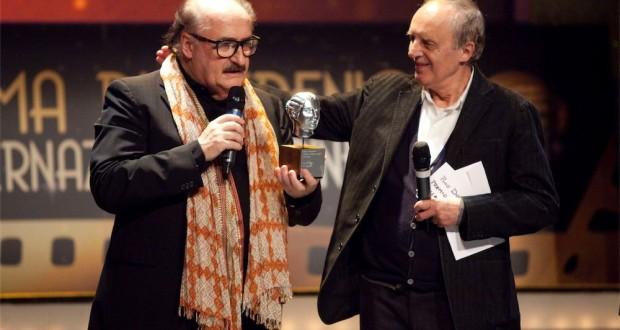COMPOSER RECEIVES LIFETIME ACHIEVEMENT AWARD FROM ARGENTO IN ROME

Pino Donaggio received a lifetime achievement award, presented to him by Dario Argento, as part of last week's La Chioma di Berenice in Rome, which honor the imagination and skills of craftsmen and artists of the Italian and international cinema: hairdressers, makeup artists, costume designers, set designers and music composers. Donaggio was interviewed by LoudVision's Donato D'Elia. The latter also separately interviewed Argento.
D'Elia was especially interested to ask both Donaggio and Argento about Brian De Palma's Raising Cain. "I speak about it with pleasure," Donaggio tells D'Elia. "My score is more atonal, more studied, and I'm also very attached to this work. De Palma, especially in our first collaborations, almost forced me to be close to the canon of Herrmann, with small variations and steps that maybe the untrained ear could not perceive, but then little by little I would always try to detach myself and to customize the job. In Raising Cain now the process had reached maturity, so I could afford to go back to a more classical score without overdoing those connotations, which can forcibly seem most derivative. But even in our latest collaboration, Passion, in the finale we return once again closer to that musical world."
ARGENTO: "BRIAN IS A FRIEND; I TAKE IT AS A COMPLIMENT"
Meanwhile, D'Elia was curious to hear Argento speak about the final shot of Raising Cain, which D'Elia tells Argento seems to "copy verbatim a famous sequence" from Argento's Tenebre. D'Elia asks Argento if he has ever confronted De Palma about the scene. "No, we never confronted the question," replies Argento, "but there was also no need, Brian is a friend. In his films he often cites Hitchcock, and this time also mentioned me, and I take it as a compliment."
DONAGGIO: "I TRIED TO CREATE A PECULIAR STYLE OF MY OWN"
Delving deeper into Donaggio's style, D'Elia tells the composer, "There is, in my opinion, a peculiar feature: the keyboard parts to introduce a serene, almost dreamlike atmosphere, and then precipitate tension with the arrival, in fact, of the strings. Am I correct in my impressions?"
"Yes, of course," Donaggio replies, "it is a process that I used from the start even, just to break away from Herrmann and exploit my knowledge as a pop arranger who had matured in the first part of my career. Herrmann communicated suspense right away, but I was trying to lighten and then give after the coup of suspense, so to speak. I saw people jump on their chairs at screenings of Carrie, because of these changes in tone: one of these was George Lucas, when Brian showed the film to him and a few others in a preview screening. I tried to create a peculiar style of my own, and I think I succeeded. As I said before, I used my Italian, come from the opera, the singing in the works already as a boy, twelve years of conservatory."
When D'Elia mentions that Donaggio's "Telescope" from De Palma's Body Double "became a big disco hit in the eighties," Donaggio replies, "It was the only piece that was always requested in record stores. That was an idea of Brian, immerse the film in those plasticky sounds, with synthesizers: everything worked properly, I think."



